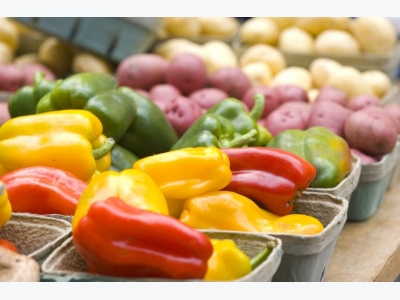Vegetable, fruit exporters must up safety standards

Experts discuss ways to boost exports of fruits and vegetables to the EU at a meeting held on Monday in HCM City. VNS Bồ Xuân Hiệp
HCM CITY — Vietnamese exporters of fruits and vegetables must improve hygienic standards of their products to avoid technical barriers imposed by the EU market, experts said at a meeting held on Monday in HCM City.
The meeting, organised by the Ministry of Industry and Trade and the European trade policy and investment support project (EU-Mutrap), discussed ways to expand the export market for Vietnamese fruit and vegetables.
Nguyễn Hữu Đạt, secretary general of the Việt Nam Fruit and Vegetable Association, said the country could face technical barriers if it failed to meet the EU’s food safety and hygiene standards.
Asian markets remain the top destination for Vietnamese products, followed by the EU, which has imported 680,000 tonnes of vegetables, fruits, flowers and other farm produce this year.
The EU requires growing standards for shade net houses as well as international certifications in plant quarantine and product traceability, Đạt said, adding that exporters should leverage their strengths in the processing of vegetables, fruits and nuts.
Sanitary standards
Đàm Quốc Trụ, consultant for the EU-Mutrap project, said sanitary and phytosanitary (SPS) standards within the framework of WTO regulations were designed to protect the health of humans, animals and plants from risks associated with hazardous species, additives, contaminants, toxins or disease-causing organisms contained in food, drinks, plants and products.
To minimise negative impact on trade, the agreement sets out principles to guide the development and enforcement of SPS measures, based on international standards, guidelines and recommendations.
The Ministry of Industry and Trade, Trụ said, should propose potential markets for export as well as negotiate with other countries on plant quarantine measures.
It should also develop market access strategies and focus on major markets where Vietnamese products have advantages, such as dragon fruit, longan, rambutan, pomelo and mango.
Concentrated production areas for key export products are needed, and policies on investment in technology for plant quarantine should be created to meet the requirements of importing countries, according to Trụ.
Ruggero Malossi, international consultant for the EU-Mutrap project, said that Europe required high standards on food safety, including the limited use of pesticides, traceability, marketing standards, labeling and packaging and contaminants.
“Strict compliance with the maximum pesticide residue level and the prevention of microbial contamination are pre-conditions for entering the European market,” he said. “Products containing illegal pesticides or higher amounts than allowed will be withdrawn from the EU market.”
Malossi told Việt Nam News that buyers in several EU member states use higher maximum residue levels than what is officially regulated. Most supermarkets have their own standards (codes of practices) regarding pesticides, which are often stricter than legal regulations.
Fresh products have to comply with general marketing standards as well, according to Malossi.
To avoid negative impact on the quality of food and risk to human health, the EU has set limits for several contaminants, especially nitrate and metals.
Contaminants are substances that have not been intentionally added to food, but may be present as a result of various stages of production, packaging, transport or holding.
The EU-Mutrap project, which began in 2012 and ends in 2018, with a total investment of 16.5 million euros (US$19.45 million), aims to promote Việt Nam’s integration into global, ASEAN and sub-regional trading systems and enhance EU-Việt Nam trade and investment relations.
For the first nine months of the year, the export value of Vietnamese fruits and vegetables is estimated to be around US$2.64 billion, 44.2 per cent higher than the same period last year, according to the Ministry of Industry and Trade.
The export value is expected to increase to $3 billion by the end of this year, the ministry said. Việt Nam exports vegetables and fruits to 60 countries and territories
Related news
 Ben Tre targets sustainable agricultural development
Ben Tre targets sustainable agricultural development The Mekong Delta province of Ben Tre has replaced rice by coconut, fruit trees, vegetables and aquaculture in an area of 7,548 hectares
 Vietnam seeks ways to boost fruit, veggie exports to EU
Vietnam seeks ways to boost fruit, veggie exports to EU Experts and businesses discussed ways to maintain and expand EU markets for Vietnam’s fruit and vegetable exports at a seminar in Ho Chi Minh City
 Agriculture tries to avoid fluctuations
Agriculture tries to avoid fluctuations Economic experts are concerned about the slow growth of the agriculture sector, which they say may affect the country’s gross domestic product (GDP) this year